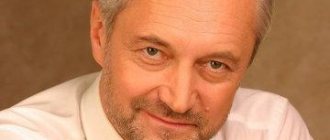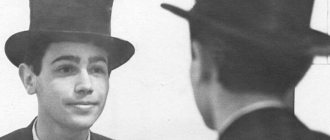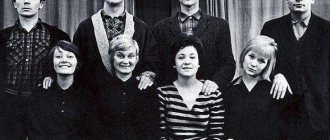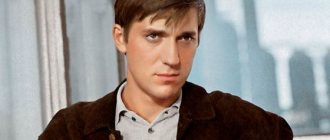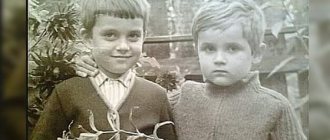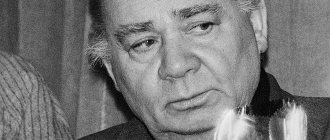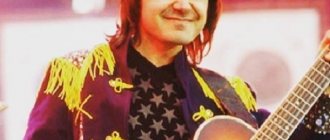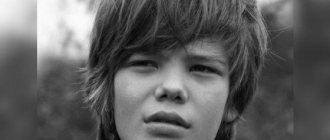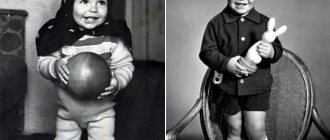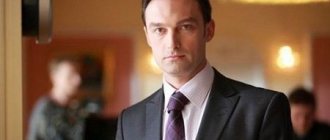Childhood and youth
Evgeniy Matveev was born in the village of Novoukrainka on March 8, 1922. The actor’s mother was a peasant, and his maternal grandfather was a church warden. The actor's father, Semyon Matveev, was an educated man, a communist by conviction, and abandoned his family when his son was four years old.
Actor Evgeny Matveev
The future actor moved with his mother to the village of Vinogradovo and there, in order to earn extra money, he sold watermelons on the road as a child. Young Evgeniy spent the money to buy a balalaika. Even then, the boy showed a penchant for creativity and composed ditties, which he performed to the accompaniment of a balalaika. Two of them, much later, were included in the film “Earthly Love,” which Evgeny Matveev directed.
The boy studied well, and his mother sent him to get an education in the city of Tsyurupinsk, which is now called Aleshki. There, the future actor first became acquainted with the theater - he saw an amateur production, was inspired and began to engage in amateur performances. Having reached the ninth grade, Evgeniy left school and went to Kherson, where there was a real professional theater. There the young man began with small roles and participation in crowd scenes.
Evgeny Matveev in his youth
In one performance, where Evgeniy played the role of a musician, actor Nikolai Cherkasov noticed him. On Cherkasov’s advice, young Evgeny Matveev went to study in Kyiv. There the actor studied at the acting school at the Kyiv Film Studio. After World War II, he worked in various theaters and eventually ended up in Moscow, where he began working as a director and acting in films.
The TVC channel released a 40-minute documentary film “Echo of Love”, dedicated to the life and work of Evgeny Matveev. People with whom he had to work and be friends tell stories about the actor and director.
Creation
Roles in the theater
Tyumen Drama Theatre
- “Young Guard” - Ivan Zemnukhov
- “Guilty without guilt” - Neznamov
- "Cunning and Love" - Ferdinand
Theater "Red Torch"
- “Great Power” - Viktor Lavrov
- "Our Mutual Friend" - John Garmon
- “Mad Money” - Telyatev
- "Party Candidate" - Leontyev
- “Wey, breeze!” — Uldys
- "Philistines" - Neil
Maly Theater
- 1952 - “Guilty Without Guilt” - Neznamov
- 1952 - “Northern Dawns” - Andrey Latkin
- 1953 - “When the spears break” - Chebakov
- 1953 - “Port Arthur” - Zvonarev
- 1954 - “Dangerous Companion” - Andrei Korchemny
- 1954 - “You Can’t Live Otherwise” - Ruddy Miltze
- 1955 - “Heart is not a stone” - Erast
- 1955 - “Sold Lullaby” - Ouli
- 1955 - “Vanina Vanini” - Pietro Missarilli
- 1955 - Macbeth - King Duncan
- 1956 - “Money” - Berkut
- 1957 - "Ghosts" - Oswald
- 1957 - “Invasion” - Fedor
- 1958 - “The Power of Darkness” - man
- 1958 - “The village of Stepanchikovo and its inhabitants” - yard guy
- 1958 - “Wings” - collective farmer
- 1958 - “When the heart burns” - military commissar
- 1958 - “Veselka” - Dmitro Shelest
- 1959 - Vanity Fair - Rawdon Crowley
- 1959 — “House of Cards” — Ignat
- 1960 - “Autumn Dawns” - Stolbov
- 1960 - “Love Yarovaya” - Mikhail Yarovoy
- 1961 - “Honesty” - Pavel Antonovich Ragoza
- 1963 - “Colleagues” - Egorov
- 1964 - “Main Role” - Trofimov
Film roles
- 1953 - Marina's fate
- 1955 - Good morning - Sergei Nikolaevich Sudbinin
- 1955 - Road - Grisha
- 1956 - The Seekers - Andrey Lobanov
- 1957 - The house in which I live - Konstantin Davydov
- 1958 - Eighteenth year - Ivan Lukich Sorokin
- 1958 - The case of the “motley” - Lobanov
- 1958 - Virgin Soil Upturned - Makar Nagulnov
- 1959 - Foal - Trofim
- 1960 - Resurrection - Nekhlyudov
- 1963 - Native Blood - Fedotov
- 1964 - Mother and stepmother - Nikolai Vasilyevich Kruglyakov
- 1965 - First Bastille - Potapov
- 1966 - Rage - Vasily Gulyavin
- 1967 - Gypsy - Budulai
- 1968 - Collapse - Pavlovsky
- 1969 - Postal novel - Kovshov
- 1970 - Those who kept the fire - Ivan Klyavin
- 1970 - Sports, sports, sports
- 1971 - And there was evening, and there was morning... - Yartsev
- 1972 - Siberian - Dobrotin
- 1972 - Mortal Enemy - Arseny Klyukvin
- 1972 - Taming the Fire - plant director
- 1973 - 1974 - High rank - Shapovalov
- 1974 - Earthly Love - Zakhar Deryugin
- 1977 - Soldiers of Freedom - L. I. Brezhnev
- 1977 - Fate - Zakhar Deryugin
- 1977 - Front behind the front line - regional committee secretary Semirenko
- 1978 - Emelyan Pugachev - Emelyan Pugachev
- 1979 - Particularly important task - Kirillov
- 1981 - Front behind enemy lines - Semirenko
- 1984 - Victory - Karpov
- 1985 - Anna and Anton / Anna es Anton
-
Anton - 1986 - Time of Sons - Semyon Petrovich Kordin
- 1986 - Testament - Ivan Krylov
- 1988 - Fathers - in-law
- 1989 - Cup of Patience - Mednikov
- 1991 - Clan - L. I. Brezhnev
- 1990 - The killer’s place is vacant... - Knysh
- 1992 - Good night! — Pal Palych
- 1995 - Love in Russian - Valeryan Petrovich Mukhin
- 1996 - Love in Russian 2 - Mukhin
- 1999 - Love in Russian 3: Governor - Mukhin
- 2001 - Under the North Star
Film director
- 1967 - Gypsy
- 1969 - Postal novel
- 1972 - Mortal Enemy
- 1974 - Earthly Love
- 1977 - Destiny
- 1979 - Particularly important task
- 1981 - Mad Money
- 1985 - Victory
- 1986 - Time for sons
- 1989 - Cup of Patience
- 1995 - Love in Russian
- 1997 - Love in Russian 2
- 1999 - Love in Russian 3: Governor
Screenwriter
- 1974 - Earthly Love
- 1977 - Destiny
- 1981 - Mad Money
- 1985 - Victory
Bibliography
- "Fate in Russian" 2000 - M. Vagrius. ISBN 5-264-00126-X
Movies
In 1963, Matveev played in the melodrama “Native Blood” together with actress Via Artmane. Evgeniy played the role of Vladimir in this film - a tank driver, and then a senior mechanic on a steamship. The hero meets the ferrywoman Sonya, played by Artmane. A romance begins between the characters, which ends with Sonya’s death, after which Vladimir has to face his beloved’s ex-husband.
Evgeny Matveev and Viya Ar
In the second half of the 60s, the film “Gypsy” was released - about Budulai Romanov, a Russified gypsy who participated in World War II, was a scout, and after the war ended up on a Don farm, where he finds his son. Evgeny Matveev acted here as director and leading actor at the same time.
In 1974, the film “Earthly Love” was released, where Matveev again turned out to be both the director and the leading actor - Zakhar Deryugin. This is an elderly collective farm chairman, a family man and the father of four sons, who unexpectedly falls in love with a young fellow villager Manya (her role is played by Olga Ostroumova).
Evgeny Matveev in the film “Earthly Love”
Three years later, the continuation of this film was released, the melodrama “Fate”, where Zakhar Deryugin, Matveev’s hero, is captured during the Great Patriotic War. Later, the hero escapes from captivity, finds himself in the ranks of the partisans and saves his own village from German soldiers who were just preparing to carry out a punitive action there.
Evgeny Matveev also played the role of Don Cossack and leader of the Peasant War Emelyan Pugachev in the historical duology of the same name directed by Alexei Saltykov. Here the actor again happened to play opposite Via Artmane, who played the role of Empress Catherine the Second. The film was released in 1978.
Evgeny Matveev in the film “Emelyan Pugachev”
In 1984, the two-part drama “Victory” was released, the main characters of which are two war correspondents, from the Soviet and American sides, who meet first at the Potsdam Conference in 1945, and then, thirty years later, at a meeting of representatives of European countries in Helsinki.
The film depicts historical characters and contains real footage from documentary chronicles. Evgeny Matveev plays General Vasily Karpov here, and also acts as a director.
Evgeny Matveev in the film “Love in Russian”
In the 90s, Evgeny Matveev released the dramatic trilogy “Love in Russian,” where he again played the main role. The hero Valerian Mukhin moves to the village and becomes a farmer. In the past, Mukhin was a major party leader, but now he leaves his wife, starts an affair with a farmer, meets new people and plans to rebuild his life. Along the way, the heroes have to fight a local crime boss.
Evgeny Matveev’s last film work was the role of General Secretary of the CPSU Central Committee Leonid Brezhnev in the six-episode melodrama “Under the Polar Star,” which was released in 2001. Before this, Matveev had already played the role of Brezhnev in the film “The Clan” in 1991. The film is dedicated to an investigation into a corruption case led by two Moscow investigators. The action takes place in the early 80s, during the Brezhnev period.
Daughter of Evgeniy Matveev: It was the doctors who missed him!
The daughter of Evgeny Matveev revealed to Sobesednik.ru the secrets of his personal life and told about the last days of the actor’s life.
On March 8, a handsome and courageous actor, People's Artist of the USSR, State Prize laureate and holder of the Order of Merit for the Fatherland, Evgeniy Semenovich Matveev, would celebrate his 94th birthday. He was literally created to play hero roles. His film works received resounding success: Makar Nagulnov in “Virgin Soil Upturned”, Nekhlyudov in “Resurrection”, Budulai in “Gypsy” (1967), Zakhar Deryugin in “Earthly Love” and “Fate”... The artist devoted himself to creativity until the last, was able to survive serious injuries and return to cinema. Sobesednik.ru talked with his daughter Svetlana Evgenievna, who dispelled rumors about his affair with actress Via Artmane and talked about his last days.
Evgeny Matveev was literally in the spotlight from childhood and dreamed of becoming an actor.
[:rsame:]
“When dad was little, he often imitated animals - imitated sounds, moved like them - and constantly copied everyone,” says the 69-year-old daughter of the actor Svetlana Evgenievna. – As a teenager, he sang sad songs in front of village women, because he was born in a village in the Kherson region. I don’t know where he got his love for sentimental songs. When he sang, the women's eyes welled up with tears. Grandmother once said: “Why are you singing sad songs?!” It’s already hard for people.” After this, the father began bawling ditties that he had heard from the locals in the village. And he did it so infectiously and humorously that everyone laughed and couldn’t stop. Dad realized that he could make people laugh and cry. He went to Kherson and entered the local theater. There he was seen by People's Artist of the USSR Nikolai Cherkasov. He advised the young man to go to study at the Kyiv film school with Alexander Dovzhenko.
Daughter of People's Artist Svetlana Matveeva / family archive
– When tuition fees were introduced, he and several fellow students did not have money to pay. Dad literally breathed the acting profession; he decided that life was over for him. I went to walk the streets...
The next day, my father decided to go to class for the last time, to say goodbye to his classmates and his beloved teacher. Dovzhenko entered the classroom, and from the faces of the students he realized that something had happened. When I found out the reason for the guys’ decadent mood, I paid for the studies myself.
Evgeniy Semenovich dreamed of standing up for his country / family archive
Evgeniy Semenovich’s student years at film school were interrupted by the war.
“Dad immediately went to the military registration and enlistment office, he wanted to be sent to the front. Back then they didn’t take recruits because they had to undergo basic training. Therefore, he was sent to the Tyumen Infantry School, where he later began teaching. The desire to defend the Motherland did not leave him, and dad constantly wrote reports to the head of the school. And he called him to himself: “Look at the stack of these reports I have! If we leave, then who will train the recruits?!”
During the war years, the Matveev family literally survived as best they could.
– My grandfather Semyon Kalinovich left the family when my father was little. He sometimes liked to drink and go for walks. Grandmother Nadezhda Fedorovna had a lively character: she was apparently tired of her husband’s partying, and most likely she kicked him out herself. Then my grandfather died at the front. Dad never spoke about this topic because he didn’t remember anything. My grandmother worked at a military factory from the age of 16, went to dig potatoes and collect vegetables. You know, it was hard not so much during the war as after it. Their family was considered to be among the intelligentsia, so they issued cards with a lower standard of support than workers. You know, my mother always dreamed of finding a ruble on the street. And when this happened, I didn’t dare to raise it.
The artist was in love with the theater from his youth. He was subject to any role / family archive
During his service, the young officer Matveev did not forget about his passion for acting and actively performed at various events. In 1946, having been demobilized, Evgeny Semenovich remained in Tyumen, where he was accepted into the theater. The actor tried his best to provide for his family and got six jobs.
– Dad worked either in the theater, or on the radio, or led some clubs. He was very tired, but did not complain. His mother and grandmother tried to feed him well and quietly gave him their last.
Matveev successfully played in the theater and was noticed at one of the All-Russian festivals. He received many offers from major theaters in Russia, but he chose the Novosibirsk Red Torch, which was called the Siberian Moscow Art Theater. Then the actor was invited to Moscow, where he was accepted into the Maly Theater, which he dreamed of.
Thanks to Alexander Dovzhenko, the actor got into the cinema / editorial archive
Evgeny Matveev made his film debut at the age of thirty-three in the comedy Good Morning directed by Andrei Frolov. This picture became one of the leaders in film distribution. It was watched by 30.5 million viewers. Soon he played Makar Nagulnov from Sholokhov’s “Virgin Soil Upturned,” then Nekhlyudov in the film adaptation of Tolstoy’s novel “Resurrection.”
– The father was considered a stranger in the movies. After all, he practically graduated from the Dovzhenko film school, was more of a theater artist, and all the film actors still graduated from VGIK. That's why they often whispered behind dad's back. But with his talent he proved that he is a professional actor.
For his unprecedented success in cinema, Evgeny Semenovich had to pay with his own health.
The actor said: “It was with my mother’s tears that I imbibed respect for women” / family archive
“It was a difficult moment in the life of our family. It happened that during filming my father was injured. When he was approved in “Virgin Soil Upturned,” Mikhail Sholokhov asked: “Can you jump?” Dad nodded. When they started filming, the horse got scared of the spotlights and bolted, and the father fell, catching his foot in the stirrup. He was dragged along the ground. It’s good that we managed to have the operation on time. Then, during a performance in the city of Nikolaev, where he was made up as Nagulnov, he turned over in a cart. It so happened that there were only police horses that never ran in harness. And so the father rode out, the spectators jumped up to applaud and scared the horses. This was one of the most serious injuries as he severely damaged his spine. My father was lying at home, receiving a disability pension - only forty-three rubles. The doctors said that there was no way for him to enter the profession anymore. He was very worried about this pause, but was able to overcome all the obstacles and began to work. True, he left the theater because he could not stand on stage for a long time.
"Gypsy" (1967) / freeze frame
Matveev’s directorial debut was the film “Gypsy,” where he played the main character, Budulai. The actor himself said: “Budulai is the perfection of human beauty.”
“He was madly excited about this idea, and the pain receded into second place. You know, usually actors on stage forget about all their illnesses, and my father was cured by his profession. During filming, he wore a tight corset and received injections. He endured it all heroically.
In the mid-1990s, Russian screens were filled with American action films, and domestic cinema was left behind. In 1995, Evgeny Matveev’s film “Love in Russian” was released.
"Good Morning" (1955) / freeze frame
“At first they wanted to call the picture “Naked Man on Bare Ground.” But they didn’t, so as not to oppress the people, since the situation in the country was difficult at that time: people lived from penny to penny. Dad showed that there is still hope for the best, no matter what. This film was a resounding success. Letters of gratitude from viewers and money came from all over the country. Imagine, pensioners sent their savings with a request to film a sequel. According to Matveev himself, he is the first to reveal the topic of the common man in such detail: “This is very close to me. I know painfully the life of a simple hard worker, on whom the state does not depend, but who carries everything on his shoulders. And the success was, I think, because we did everything sincerely.”
Evgeniy Semenovich treated his fame - both as an actor and as a director - with surprise.
"Virgin Soil Upturned" (1959) / freeze frame
“Sometimes dad didn’t understand why everyone applauded him so much. As soon as he walked on stage, the entire audience stood up and applauded. The audience didn't let him go for 4 hours! The fans literally did not give life. At the entrance there were always flowers and notes with confessions under each step. When we read them, we fell over laughing. In one it was written that the girl was going to come to Moscow and live with us. My father left the theater in someone else's clothes through the back door. But this did not save him, as fans rushed towards his car and almost threw themselves under it. Bells were constantly ringing in the apartment. Sometimes fans said not very pleasant things to my mother. But she took it calmly, did not take it into her head, because she was distinguished by feminine wisdom.
Lidia Alekseevna and Evgeniy Semenovich lived happily in marriage for 56 years.
“Mom always gave in to father. Despite this, everything worked out the way she wanted. One day I wanted to move the furniture in the apartment, but my father didn’t like it. When he left for filming, my mother rearranged everything. The father returned, saw the changes in the room and said nothing. You know, I look at modern women who are trying to take leadership in the family, to be above a man, and I think: why? Mom tried to create comfort and a homely atmosphere for my father. This was the only way he could work and exist calmly.
Evgeniy Semenovich often thought about the laws of the Universe / Viktor Goryachev
The actor's wife sacrificed her career for her husband. In one of his interviews, Evgeny Matveev said: “My wife is my victim, she could have become a famous artist, but instead she sang in the choir all her life.”
– My mother was a singer. When we lived in Novosibirsk, dad was known as “Matveeva’s husband.” At that time, she actively worked and fed the whole family, until her father revealed himself as an actor. After Novosibirsk, dad was invited to several theaters, and he chose Maly in Moscow, which he dreamed of. Mom didn’t think for a second and said that we had to go. Then she got a job in the Bolshoi Theater choir, where she worked all her life.
If fans lost their heads over the actor, then what can we say about the actresses who starred with him.
“Native Blood” (1963) / RIA Novosti
– Dad always said that when love plays, you need some kind of clue. He played so hard that all the women cried. When “Native Blood” was filmed, his partner was Via Artmane. Then a rumor spread that they were supposedly having an affair. The father was worried because he had no idea how to behave with her in love scenes: “She is so cold, somehow distant, pressed.” Then they became friends, and it turned out to be a wonderful film story. Dad knew how not only to find an approach to his partners, but also to masterfully get out of character, so to speak, without consequences. After the death of his father, a rumor was born that he had a daughter from Artmane. I think it is incorrect to talk about this when two of the characters in this story are not alive and they cannot answer. Mom said that NTV called her, inviting her to the program, and informed her about it. She exclaimed: “What, also a daughter?!” The fact is that they used to say that they supposedly have a son. But the facts indicate that this is not the case. When the father met Artmane, her son was 6 years old, and her daughter Christiana was born in 1965. “Native Blood” was filmed in ’63 and came out in ’64. And how could the father and the actress communicate later if they lived in different cities: he in Moscow, she in Riga?
The actor was not only a jack of all trades in his profession, but also in everyday life.
"Time of Sons" (1986) / Global Look Press
“I could do any man’s housework and cook something.” We usually left food for him in the refrigerator. Each pot and jar was labeled so that dad could immediately find his way. After all, he ate separately and dietaryly. One day I come home, and there’s smoke like a rocker,” continues the actor’s daughter. “I ask my father: “Have you had dinner?” He responded: “Yes, it was very tasty, try it yourself.” I look at the frying pan, and there is a cinder there. It turns out he wanted to heat up the pancakes. When they called him, he got distracted and left the kitchen. Dad was completely immersed in his creative ideas and could forget about many things.
After work, Evgeniy Semenovich returned home and locked himself in his office, working at night on new scripts.
– Dad worked a lot at home. I was reading and writing something all the time. And of course, he liked to do it in silence. And my little son Alyosha was interested in the closed door. He really begged to see his grandfather and couldn’t resist - he broke the glass door with a souvenir smoking pipe. The father was very scared that his grandson had hurt himself. Now Lesha is 40 years old. He is a lawyer and economist by education. He has a three-year-old son, Olezhka. Lesha was not particularly eager to follow in his grandfather’s footsteps. True, when I was still a child, on my father’s 60th birthday he performed a poem at the House of Cinema. Then our phone was ringing off the hook - everyone wanted to film him. I told him that first he needed to get a regular profession, which would always be behind him, and then, if he wanted, he could start an acting career.
Andrey has three children. An adult son, Evgeniy, has a daughter, Sonya, and will soon have another girl. Nadya has a son, Yaroslav, he is one and a half years old. And daughter Lisa. She is still little, goes to sixth grade, plays music and sports.
“Resurrection” (1960) / editorial archive
Although Evgeny Matveev had an ardent disposition, he never took it out on children.
– Dad never scolded us for our tricks with Andrei (the actor’s son, died in 2008 – Author). He knew how to make jokes so intelligibly and instructively that we were ashamed later. In general, we were a little afraid of him, although I don’t know why. When I was in elementary school, we were given grades for behavior. I was the head girl then. Once I took the whole class out of class to go to the cinema. It was spring then, the weather was amazing, and I didn’t feel like studying. And they gave me a D in my diary. To hide it, I glued two pages in it. When my father found out, he shamed me not for the grade, but for the fact that I hid this fact. I also remember when I was eight years old and my parents and I were riding on a trolleybus, I saw an empty seat and immediately landed on it. Dad looked at me and said to mom: “You know, Lida, let Svetochka sit. She is so old and weak. And you can stand.” She barely waited for her stop and ran out of the trolleybus all red with shame. I remembered this lesson for the rest of my life. A few months before his death, my father was offered to make a film about the Prophet Muhammad, continues Svetlana Matveeva. “He began to study the Bible not as a church book, but as a chronicle of life. He was interested in the difference between Islam and Orthodoxy, although he himself was an atheist. When I was in Jerusalem at the Holy Sepulcher, I was very impressed by the atmosphere. Dad began to have questions about the origins of man and about God. And before his death, he asked to be buried in church.
The actor’s grandchildren remember their beloved grandfather every day / Viktor Goryachev
The artist literally worked his ass off and did not spare himself: he went to events, performed, and wrote scripts. On May 5, 2003, Evgeniy Semenovich was urgently hospitalized at the Central Clinical Hospital straight from his dacha, where he felt unwell.
– We thought that dad was having an attack of chronic bronchitis and everything would be fine... After the medical examination they said that there was nothing to worry about, there was supposedly a small spot in the lungs. We began to sound the alarm. He became worse and worse, he stopped eating and became very weak. We went to the hospital again, where we were told that it was not time to admit my father yet: they said it was not his turn yet. I think the doctors missed him because they scheduled a medical examination too late and didn’t even register him. He really wanted to return home as quickly as possible and asked me to talk to the doctor: they say, there is nothing serious... But the doctor said that my father would not return from the hospital because he had the fourth stage of cancer,” Matveev’s daughter indignantly continued the story. “They said he had from one day to six months left.” When I left the office, I was literally dumbfounded. We didn't really know about it! When everyone arrived to visit dad, he went to the bathroom, smoked, then sat on the bed and collapsed. We rushed to call our sister and doctor. When we were all kicked out of the room, they began pumping out father. But the miracle did not happen... He was gone. When I went to the hospital to get documents, the doctors said: “Why are you surprised, didn’t you know that he was dying?” But we really had no idea about anything, we thought that he would simply be treated.
There are always a lot of flowers at the grave of the People's Artist of the USSR / family archive
Evgeny Matveev died on June 1, 2003 and was buried at the Novodevichy cemetery in Moscow.
“When the whole country became aware of his death, neighbors, acquaintances and just strangers began to come to us and support us: “Eugene was an icon, a deity for us.” Even when he walked across the yard, everyone literally froze. You know, I regret that I didn’t write down all my father’s stories and life events. After all, we talked with him about a lot of things, discussed them, and he always said everything straight, as it is. He had excellent intuition. He even predicted political events. For example, with the arrival of Gorbachev, he said that there would be a difficult period in the country. In general, he was very concerned about the political situation in the world. I think even now, almost thirteen years later, we would hear his forecasts. I hope he gives us a sign.
Personal life
The actor was married to Lidia Alekseevna Matveeva, whom he met in 1947. The couple spent fifty-six years of marriage. His wife gave birth to Evgeniy’s two children—a son and a daughter—and later the actor had three grandchildren. The actor met his wife in Novosibirsk, and then the young couple moved to Moscow together, where Evgeniy began working at MDT. By that time, a daughter had already been born into the family, and the director of the theater promised to provide living space for the young family.
Evgeny Matveev with his family
At first, the Matveev family lived in a hotel, and then moved to a communal apartment, and their youngest son Andrei was born there. The actor’s wife was also a person of a creative profession; she graduated from the vocal and choir departments and eventually sang in the choir. Lydia had to sacrifice her serious creative career in order to provide for her family while her husband was building his career.
Evgeny Matveev: biography
Soviet and Russian actor and director. Known for the films of the “Love in Russian” series, the films “Gypsy”, “Earthly Love” and others. People's Artist, winner of numerous awards. Father of two children.
Video course “Spring”
Landscaping for busy people, a beautiful garden without the hassle
A training course for those who want to make their dacha beautiful and prefer to spend their time, effort and money wisely.
Special offer! 50% discount! Make good use of your self-isolation!
₽ 1200.00 ₽ 600.00
MORE ❯❯❯
Latest news about Dr. Dew
Evgeny Matveev continues to run several channels on YouTube dedicated to issues of car repair and the manufacture of useful gadgets. The Pit_Stop Workshop channel has already recorded more than seventy million views - a serious number! Fans of the prankster and professional in welding, repair and test drives leave enthusiastic comments to their idol every day.
“The concentration of sarcasm in the video exceeds all norms!” - referring to the story entitled “I was “very pleasantly surprised” by these homemade products!”
“Dr. Dew swears so much about the bad welding that you want to take it and cook it smoothly, like a 3D artist!”
"Funny channel! It lifts your spirits and you can learn a lot of useful things!”
“That’s what I like about Dr. Dew: if he doesn’t know something or isn’t sure, he honestly says: “I’m not good at this, sorry.” He’s extremely positively different from those who pretend to be know-it-alls!”
Disputes about where Evgeny Matveev lives and works are still ongoing. The controversy is fueled by the fact that Dr. Dew regularly posts videos from Moscow, St. Petersburg and other Russian cities. Why argue if it is clear that he continues to work in his Crimean workshop? Moreover, in January 2020, he proudly posted a photo of the renovated premises on all his accounts. The master bought new hardware for filming a video, and his fans are enthusiastically waiting for fresh equipment repair manuals and simply cool stories from their idol.
Titles and awards
- Honored Artist of the RSFSR (1958)[9]
- People's Artist of the RSFSR (1964)
- People's Artist of the USSR (1974)
- USSR State Prize (1978) - for the creation of feature films “Earthly Love” and “Fate”
- State Prize of the RSFSR named after the Vasilyev brothers (1974) - for creating the image of a contemporary in films of recent years
- Two Orders of Lenin (1971, 1982)
- Order of the October Revolution (1986)
- Order of Merit for the Fatherland, II degree (2002) - for outstanding contribution to the development of Russian cinema
[10] - Order of Merit for the Fatherland, III degree (1997) - for outstanding services in the development of Russian cinema
[11] - Medal "For victory over Germany in the Great Patriotic War of 1941-1945"
- Medal "Twenty Years of Victory in the Great Patriotic War 1941-1945"
- Medal "Thirty Years of Victory in the Great Patriotic War 1941-1945"
- Medal "Forty Years of Victory in the Great Patriotic War 1941-1945"
- Medal "50 years of Victory in the Great Patriotic War 1941-1945"
- Medal "For the Defense of Kyiv"
- Medal "Veteran of Labor"
- Medal "In Commemoration of the 100th Anniversary of the Birth of Vladimir Ilyich Lenin"
- Medal "In memory of the 1500th anniversary of Kyiv"
- Medal "In memory of the 850th anniversary of Moscow"
- Medal "70 years of the Armed Forces of the USSR"
- Medal “For Special Contribution to the Development of Kuzbass”, 1st degree (2002) - for many years of fruitful work, high professionalism, significant contribution to the socio-economic development of the region
[12] - Gold medal named after A.P. Dovzhenko (1974, for creating images of contemporaries in cinema)
- Gold medal named after A.P. Dovzhenko (1978, film “Fate”)
- Film Festival of the Republics of Transcaucasia and Ukraine (1968, Diploma of the Union of Journalists of Armenia, film “Gypsy”)
- All-Union Film Festival, in the category “First Prize among Historical and Revolutionary Films” (1970, Minsk, film “Post Romance”)
- All-Union Film Festival, in the category “Special Film Festival Award” (1978, award for best director and award for best actor, film “Destiny”)
- XXXI International Film Festival of Working People in Czechoslovakia (1980, Prize for best performance of a male role, film “Emelyan Pugachev”)
- All-Union screening-competition of films about the working class in Yaroslavl (1981, First prize, film “A Particularly Important Task”)
- All-Union Film Festival, in the category “Special Film Festival Award” (1985, film “Victory”)
- International Film Festival of Cinema Actors “Constellation” (1995, Prize “For Outstanding Contribution to the Profession”)
- International Film Festival in Tashkent (1997, Golden Archa Prize for Best Actor, film “Love in Russian-2. Women’s Defense”)
- Honorary citizen of the Sverdlovsk region (2002)[13]
